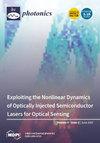基于光交换和分配网络的可重构微波多波束成形
IF 1.9
4区 物理与天体物理
Q2 OPTICS
引用次数: 0
摘要
微波光子学中的光波束成形技术有望支持宽带无线通信。然而,由于射频(RF)信号和天线元件(AE)之间的固定连接,目前的光波束成形缺乏自由度。为应对这一挑战,本手稿提出了一种动态光波束成形架构,可根据待传输信号的数量重新配置用于信号传输的天线子阵列。该架构采用光交换和分配网络(SDN)来实现信号和 AE 之间的灵活连接。在光子集成电路中提出的架构实例可实现三种工作模式,并通过 16 个 AE 传输 4 个射频信号。光场分布和光束模式图说明了操作原理,并验证了所提 SDN 架构的可行性。此外,还分析和讨论了所引入的架构对信号幅相一致性的影响,以及所提议的动态架构与传统固定架构的比较。结果表明,所提出的架构能以较低的硬件复杂度实现可变波束成形增益。本文章由计算机程序翻译,如有差异,请以英文原文为准。
Reconfigurable Microwave Multi-Beamforming Based on Optical Switching and Distributing Network
Optical beamforming in microwave photonics is promising for supporting broadband wireless communications. However, the current optical beamforming lacks freedom because of the fixed connection between radio frequency (RF) signal and antenna elements (AEs). This manuscript tackles this challenge by proposing a dynamical optical beamforming architecture that reconfigures the antenna subarray for signal transmission depending on the number of signals to be transmitted. The proposed architecture employs an optical switching and distributing network (SDN) to realize a flexible connection between signals and AEs. An instance of the proposed architecture in photonic integrated circuits, which enables three working modes and transmits four RF signals through sixteen AEs, was presented and numerically simulated. The optical field distribution and beam pattern plots illustrated the operational principle and validated the feasibility of the proposed SDN architecture. Furthermore, the impact of the introduced architecture on the signal amplitude–phase consistency and the comparison of the proposed dynamic architecture and conventional fixe architectures are analyzed and discussed. The results indicate that the proposed architecture exhibits variable beamforming gain with lower hardware complexity.
求助全文
通过发布文献求助,成功后即可免费获取论文全文。
去求助
来源期刊

Photonics
Physics and Astronomy-Instrumentation
CiteScore
2.60
自引率
20.80%
发文量
817
审稿时长
8 weeks
期刊介绍:
Photonics (ISSN 2304-6732) aims at a fast turn around time for peer-reviewing manuscripts and producing accepted articles. The online-only and open access nature of the journal will allow for a speedy and wide circulation of your research as well as review articles. We aim at establishing Photonics as a leading venue for publishing high impact fundamental research but also applications of optics and photonics. The journal particularly welcomes both theoretical (simulation) and experimental research. Our aim is to encourage scientists to publish their experimental and theoretical results in as much detail as possible. There is no restriction on the length of the papers. The full experimental details must be provided so that the results can be reproduced. Electronic files and software regarding the full details of the calculation and experimental procedure, if unable to be published in a normal way, can be deposited as supplementary material.
 求助内容:
求助内容: 应助结果提醒方式:
应助结果提醒方式:


